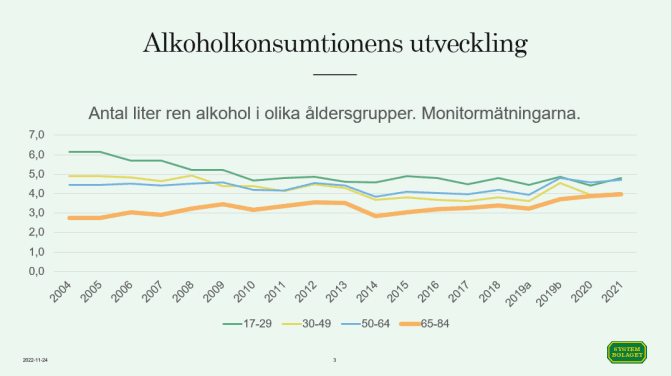The Central Association for Alcohol and Narcotics Information (CAN) released a new report showing a positive trend of more people in Sweden going alcohol-free.
A quarter of Swedes over the age of 16 have not consumed alcohol in the last 30 days. It is the highest figure in the survey’s twenty-year history,” says Ulf Guttormsson, head of department at CAN, as per Accent reporting.
During the pandemic, alcohol consumption fell in the entire population.”
Ulf Guttormsson, head of department, CAN
There were fewer opportunities to consume alcohol in restaurants, fewer alcohol-fueled parties, and fewer trips abroad where Swedes would engage in heavy alcohol use.
The percentage of people in Sweden who had not consumed alcohol in the last 30 days also increased, from 23% to 25%.
Overall, alcohol consumption has bounced back and is more similar to the level of 2019. What has changed is the percentage of people who stay alcohol-free in the last 30 days. Mainly, it is the people under the age of 50 who consume less alcohol and stay alcohol-free longer.
This development is not due to effects from the COVID-19 pandemic.
It could be the sober teenagers from the beginning of the 2000s who have grown older and are now in the 30-49 age category,” says Mr Guttormsson, according to Accent.
The new generations of pensioners have brought with them the alcohol consumption behavior from their youth.”
Ulf Guttormsson, head of department, CAN
Mr Guttormsson points out that there is no sharp increase in the proportion of people quitting alcohol or going alcohol-free completely. But the positive trend of a growing number of people in Sweden living alcohol-free still has meaning.
We started at 21% 20 years ago, so the increase is only four percentage points. It is not a dramatic effect, but on the other hand, four percentage points of the population between 16 and 84 is a few hundred thousand individuals.
The survey also shows that the difference between different groups is decreasing overall.
Ulf Guttormsson, head of department, CAN
It is a long-term trend that alcohol consumption is becoming increasingly similar, between the sexes, geographically, and between different age groups in Sweden. The groups that consumed the most alcohol, i.e. men, young people, and people living in big cities, still consume the most, but at the it is in those groups where the biggest reductions in alcohol use happen.
Positive development for public health, safety, and prosperity

The President of IOGT-NTO, Lucas Nilsson, puts the latest figures into context, in a statement for Movendi International. While the development that more people stay and decide to go alcohol-free is very positive for society, more work needed to be done in Sweden to further prevent and reduce alcohol harm, according to Mr Nilsson.
The Swedish population has enjoyed a general decline in the total consumption of alcohol since the peak of 2004. This development has mainly been driven by young people, and has been immensely beneficial for issues of public health, safety and prosperity.
Much work is still to be done, however, as the harm caused by alcohol is still considerable, and I am concerned of recent talks to roll back proven and effective alcohol policy solutions that Sweden has had in place for years.
Lucas Nilsson, President, IOGT-NTO
IOGT-NTO is the largest social movement in Sweden and Europe for alcohol prevention. The organization, a member of Movendi International, is concerned about government plans to do away with the country’s world class alcohol policy system, by disbanding the government-run alcohol retail monopoly.
In April 2023, a new survey carried out by Kantar Public showed that almost half (46%) of people in Sweden think that not enough is being done to reduce alcohol damage in society.
At the same time, only one in five (20%) think that enough is being done.
Despite the public interest in improving alcohol policy, the country’s most important tool for preventing and reducing alcohol harm – the Swedish alcohol retail monopoly – is under serious threat.
In 2020, a report revealed that it is multinational liquor giants that are pushing for so called “farm sales” of alcohol in Sweden. The lobbying push was exposed as a scam that is about promoting the profit interests of the world’s largest alcohol corporations instead of small local wine makers. In other words, so called “farm sales” (Gårdsförsäljning) is the alcohol industry’s trojan horse to deregulate alcohol sales in Sweden and overthrow Systembolaget in pursuit of corporate profit maximization. The report exposed three main myths about “farm sales” propagated by Big Alcohol to manipulate the public and garner political support.
That is why IOGT-NTO is appealing to the government to listen to the public and to stop the proposal to introduce so-called farm sales of alcohol that would disband the country’s world-class alcohol policy system.
In Sweden, alcohol consumption decreased during the pandemic years of 2020 and 2021. This was also the case in some other European countries, but not all and it plays out as a natural experiment of different policy measures.
In Sweden, a recent study showed that the change can be attributed to the decrease in personal import of alcoholic products from neighbouring countries with lower health-promoting alcohol taxes. After the pandemic, consumption levels have basically returned to pre-pandemic levels. It shows how alcohol policy is an issue that needs to be addressed on an international level. Today, EU member states can undermine their neighbours’ effective alcohol policy by lowering alcohol taxes, to the detriment of EU citizens’ rights to health and prosperity.
Lucas Nilsson, President, IOGT-NTO
More needs to be done to address Sweden’s alcohol harm
The age group 17–29 years reported the highest annual alcohol consumption in 2022. This is a big problem for society, as alcohol use by minors is a serious risk factor for later alcohol harm in adulthood.
Compared with the age group that consumes the least alcohol (65 to 84-year-olds), the youngest
group’s alcohol use is 20% higher. However, in 2004, the youngest group consumed more than twice as much alcohol as the oldest group.
This means that the gap between the age groups has shrunk, in part because alcohol use among younger people in Sweden is falling and in part because alcohol use of older people is rising.
The survey shows that in 2022, the difference in annual alcohol consumption between the different age groups was the smallest in the history of the survey.
Alcohol consumption among older people, age 65 and over, does not follow the positive trend of declining alcohol use among other age groups in Sweden.
The oldest age groups consume more alcohol today compared to previous generations.
Alcohol use among older people has increased by 30% compared to 2004.
In September 2023, Movendi International reported that addiction doctors and researchers were demanding a new agenda for alcohol prevention in Sweden as the country faces of growing alcohol deaths among older people.
Addiction doctors and researchers in Sweden say alcohol is a serious risk factor for death and disease both in Sweden and globally.
They raise the alarm that rising alcohol use among older Swedes is masked by the positive reduction in overall alcohol use in the country. Population-level alcohol consumption has declined in Sweden from 10.6 liters of alcohol in 2004 to 8.7 liters in 2021.
This positive development has largely been driven by young adults. It means that mortality caused by alcohol is also falling in the entire population.
On the other hand, people over the age of 65 have increased their alcohol intake and with it mortality caused by alcohol is rising among older people.
The addiction doctors and researchers point to the problem that very few patients receive help for their alcohol use problems.
Only 1% are offered support services for alcohol use disorder.
In fact, there has not been any improvement in the provision of much needed mental health services for alcohol use problems in the period of 2013 to 2021.
Older people are more vulnerable to alcohol harm
In 2019, Movendi International member organization IOGT-NTO, in collaboration with addiction researchers and, among others, the Swedish Medical Association produced the report Alcohol and the Elderly.
Already then, the report revealed evidence that alcohol consumption and alcohol harm were increasing among older people in Sweden.
According to the report, increased sensitivity to alcohol in old age combined with the ageing process can increase risk of disease and accidents among older people caused by alcohol.
For example, use of alcohol increases risk of cardiovascular disease, diabetes, dementia, and cancer for older people. The harm is aggravated when alcohol is combined with prescription drugs. For example this combination can result in heightened risk of falls and injuries. The report also outlines various health and social challenges older people may face as a result of alcohol use. These challenges include, depression, suicide, road traffic accidents but also intimate violence and more broadly elder abuse.
Several common medical conditions are caused, or worsened, by high alcohol consumption, the doctors write in Sweden’s Medical Journal “Läkartidningen“:
- cardiovascular diseases,
- several forms of cancer,
- sleep disorders,
- depression,
- anxiety,
- neurological problems,
- stomach and skin problems,
- infections and difficult-to-heal wounds.
According to the World Health Organization, there is a connection between alcohol and over 200 diseases. Alcohol also interacts with other drugs, and questions about patients’ alcohol consumption are therefore important when prescribing drugs.”
Per Nilsen, Sven Andréasson, and Karin Hyland, in Läkartidningen
Minimizing alcohol harm for older people
Alcohol consumption and alcohol-related harm, whether in the form of chronic disease or acute harm, has increased amongst Sweden’s older people in recent years. The percentage of the population classified as elderly has increased and will continue to do so.
Prevention of disease and harm, including disease and harm due to alcohol, is, therefore, very important – both for all those at risk and for the health and medical care sector. The report provides a set of recommendations to prevent and reduce alcohol harm specific to older people:
- While there is no safe limit for alcohol use, older persons who are using alcohol are advised to limit their use to 1 or less alcoholic drinks per day to reduce health risks.
- Those who don’t consume alcohol or who use alcohol occasionally are advised to not begin alcohol use, re-initiate alcohol use, and not to consume alcohol more frequently on the basis of health considerations.
- Older people suffering from health conditions including liver disease, peptic ulcer disease, cardiac arrhythmia, are driving, have cognitive difficulties, a history of falls or poor balance, or who take psychoactive or sedating medications are advised not to consume any amount of alcohol to mitigate further harm from alcohol in combination with these conditions.
Summary of the CAN report
Some key findings of the new CAN report:
- Alcohol consumption is lower in smaller cities/towns and rural municipalities.
- In general, alcohol consumption decreases with decreasing population density.
- In comparison with the survey’s starting year in 2004, self-reported annual alcohol consumption has fallen.
- Above all, men’s alcohol consumption has fallen. Despite this, men still consume almost twice as much alcohol as women (84% more).
- In 2022, beer accounted for 54% of men’s alcohol consumption (20% for women).
- Women’s alcohol consumption was dominated by wine, at 68% (29% for the men).
Citation
Guttormsson U. Självrapporterade alkoholvanor i Sverige 2004–2022. Stockholm: Centralförbundet för alkohol- och narkotikaupplysning (CAN); 2023. Rapport 222.

